Facts For Editorial Reference About The Making Of David Lean’s Film Of Boris
Pasternak’s Doctor Zhivago |
Read more at in70mm.com The 70mm Newsletter |
| Written by: Text and images by M-G-M's Publicity Department. From Sebastian Rosacker's Archive. Prepared for in70mm.com by Brian Guckian, Ireland | Date: 22.12.2015 |
 NOTE
TO THE PRESS: Because of the fame of the novel on which "DOCTOR ZHIVAGO" is based, the
epic scope of the story against a background of one of history's most
crucial periods, and the picture's distinguished producer, director and
cast, the M-G-M Publicity Department has prepared this factual service
booklet.
Every effort has been made to incorporate in it the source material
uncovered during filming of the spectacular picture on vast locations in
Spain and Finland. NOTE
TO THE PRESS: Because of the fame of the novel on which "DOCTOR ZHIVAGO" is based, the
epic scope of the story against a background of one of history's most
crucial periods, and the picture's distinguished producer, director and
cast, the M-G-M Publicity Department has prepared this factual service
booklet.
Every effort has been made to incorporate in it the source material
uncovered during filming of the spectacular picture on vast locations in
Spain and Finland.If further information in connection with the material or production is desired, please communicate with: M-G-M Publicity Dept., 1540 Broadway, New York, N. Y., 10036. |
More in 70mm reading: “Doctor Zhivago”: The North American Roadshow and 70mm Engagements The Latest Word From METRO-GOLDWYN-MAYER on DAVID LEAN’S Film of DOCTOR ZHIVAGO. From The Novel By Boris Pasternak PDF: MGM Press Reviews 70mm Blow Up List 1965 - by in70mm.com |
The Novel |
|
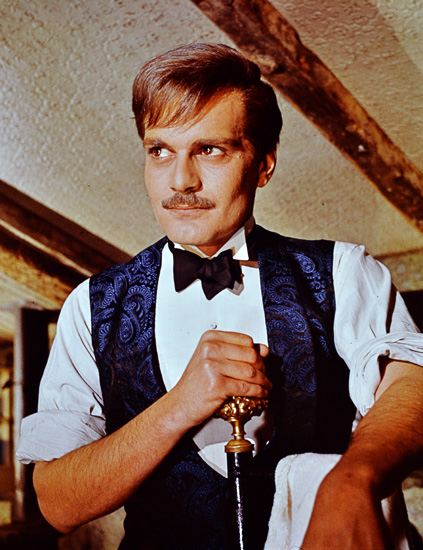 "Doctor Zhivago," suppressed in the Soviet Union, has been called the only
truly great novel to come out of post-revolutionary Russia. Its publication
in translation, after the Soviet government had tried without success to
prevent it, was followed by award of the Nobel Prize for Literature to Boris
Pasternak, generally recognized as his country's finest modern writer. When
he was informed by Russian authorities that if he went to Sweden to accept
the prize he would not be permitted to return. Pasternak remained true to
his native land and regretfully declined the award. "Doctor Zhivago," suppressed in the Soviet Union, has been called the only
truly great novel to come out of post-revolutionary Russia. Its publication
in translation, after the Soviet government had tried without success to
prevent it, was followed by award of the Nobel Prize for Literature to Boris
Pasternak, generally recognized as his country's finest modern writer. When
he was informed by Russian authorities that if he went to Sweden to accept
the prize he would not be permitted to return. Pasternak remained true to
his native land and regretfully declined the award.It was Giangiacomo Feltrinelli, of Milan, who defied Russian authorities, bringing "Doctor Zhivago" to the attention of the world by publishing it, in Italian, on November 15, 1957. In September, 1958, it was first published in the United States. Since then it has been translated into 28 languages, including Arabic, Hebrew and Urdu. Its only publication in the original Russian has been in a special edition prepared by the University of Michigan Press. In every country in which it has since appeared, "Doctor Zhivago" has been acclaimed by critics as the outstanding literary achievement of this century, written with extraordinary perception and poetic sensitivity. It is a book in the epic tradition of Pasternak's predecessors, Tolstoy and Dostoyevski: a drama which details — through its characters — the environment and lives of the Russian people during the first half of the twentieth century. As in "Gone With The Wind" and "War And Peace" it is set against the revolutionary uprising of a suppressed people, and evokes the complex twists and turns of their lives, the utter humanness of their needs, in a society over which they have little control. It is a book which questions the very root of human values and has the courage—despite its view of suffering, poverty and sharp blows of fate—to make a positive statement of faith in mankind. |
|
Excerpts From Reviews Of The Novel |
|
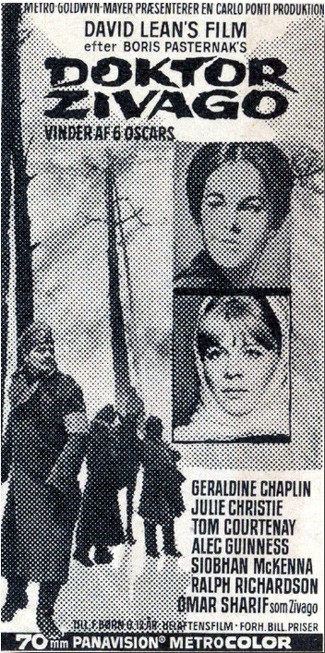 '"Dr. Zhivago' is a great novel of our times...unique in concept, poetic in
execution, devastating in power, suffused in delicately mystical philosophy,
deeply tender in romance, nakedly surgical in its dissection of political
folly, and honest in its conviction that man is a simple, if noble, figure
in a complex cosmos...Not since Tolstoy has so passionate a faith been
preached." '"Dr. Zhivago' is a great novel of our times...unique in concept, poetic in
execution, devastating in power, suffused in delicately mystical philosophy,
deeply tender in romance, nakedly surgical in its dissection of political
folly, and honest in its conviction that man is a simple, if noble, figure
in a complex cosmos...Not since Tolstoy has so passionate a faith been
preached."— THE SATURDAY REVIEW "One of the most significant books of our time and a literary event of the first order." — NEW YORK TIMES "It is a book a reader will never forget — a must for anyone who really wants to understand Russia and the Russians." — CHICAGO TRIBUNE "A sweeping panorama of authentic history and of man's struggles, complete with scores of characters in a fascinating interwoven tale. You will not want to put it down until the last page." — WASHINGTON POST AND TIMES HERALD "The best novel to come out of prerevolutionary Russia. It is an affirmation of belief in the individual as opposed to the mass, an article of faith in humanism. But it is even more than this, it is a novel in the richest tradition of 19th century Russian literature." — LOS ANGELES TIMES "Pasternak has truly achieved a triumph and has established himself among the other immortals of great Russian and world literature." — CATHOLIC REVIEW SERVICE "It stands head and shoulders above anything else that has come out of 20th century Russia and belongs with the greatest novels of the 19th." — CLEVELAND PLAIN DEALER "This is not just a story of the Red revolution, it is more. Men and women in an endlessly fascinating land, remote and exotic, fight the great battles men and women have always fought, struggle with fate, break under grief and tragedy, and rise splendidly to moments of ecstatic love." — ASSOCIATED PRESS "A truly great novel. Pasternak writes with a superb evocative power." — NEW YORK HERALD TRIBUNE "Will...come to stand as one of the great events in man's literary and moral history. His book is a great act of faith in art and in the human spirit." — THE NEW YORKER "Magnificent novel. When the Russian revolution is even further past than the American revolution, interest in this book will persist because it is writing of so excellent a quality, its characters will walk so close to its readers, and the towns and fields of its events will be a part of our own memory." — HOUSTON POST "A thrilling reading experience — not only for the insight it offers to the Western reader, but, more important, it is the work of an artist." — COLUMBUS DISPATCH "This novel is a masterpiece of artistry and a monument to the troubled times or revolutionary upheaval of which its hero, Dr. Zhivago, was a detached but perceptive witness. It is Pasternak at his best." — BALTIMORE SUNDAY SUN "The book is a masterpiece. It has both grace and power. Here is a work of extraordinary originality, strength and brilliance." — ST. LOUIS POST-DISPATCH |
|
The Motion Picture |
|
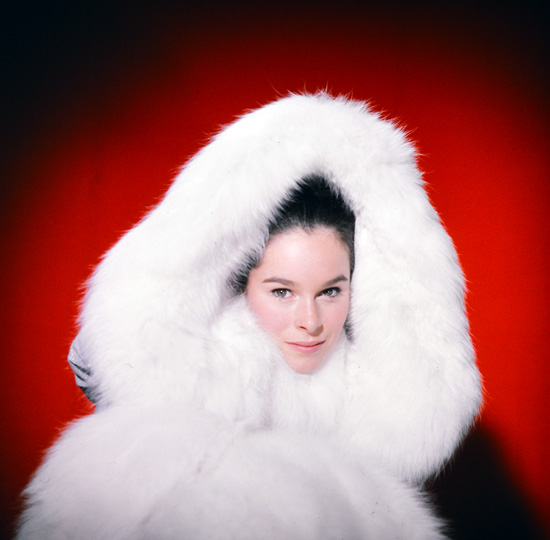 The story of "Doctor Zhivago," filled with the excitement of great events,
the fire and passion of human emotions, and the drama provoked by complex,
fascinating characters caught in the web of these events, is being brought
to the screen in Panavision and color by Metro-Goldwyn-Mayer.
Many companies sought motion picture rights to the novel following its
publication. Carlo Ponti, whose film productions have numbered some of the
most successful pictures in recent years, obtained the rights from Italian
publisher Feltrinelli in late 1962. Shortly thereafter he and Robert H.
O'Brien, President of Metro-Goldwyn-Mayer, began discussions about the
motion picture production. They agreed that David Lean would be the ideal
director to realize on the screen the full potential of the novel, with its
depiction of intimate human relations against a vast background of sweeping
events. The story of "Doctor Zhivago," filled with the excitement of great events,
the fire and passion of human emotions, and the drama provoked by complex,
fascinating characters caught in the web of these events, is being brought
to the screen in Panavision and color by Metro-Goldwyn-Mayer.
Many companies sought motion picture rights to the novel following its
publication. Carlo Ponti, whose film productions have numbered some of the
most successful pictures in recent years, obtained the rights from Italian
publisher Feltrinelli in late 1962. Shortly thereafter he and Robert H.
O'Brien, President of Metro-Goldwyn-Mayer, began discussions about the
motion picture production. They agreed that David Lean would be the ideal
director to realize on the screen the full potential of the novel, with its
depiction of intimate human relations against a vast background of sweeping
events.Lean, whose two previous films, "The Bridge on the River Kwai" and "Lawrence of Arabia," between them won practically every award in the book (including a total of 14 Oscars), read the story while sailing from England to the United States. Before reaching New York, he had made up his mind that not only did he want to make a film of "Doctor Zhivago," he felt he had to do so. The fascinating characters and the towering historic events against which their story is etched made the perfect combination for a motion picture that, he felt, could become both exciting and significant entertainment. It was his immediate suggestion that he talk to Robert Bolt to see if Bolt would be interested in writing the screenplay. Lean stated that he felt that Bolt was one of the very few dramatists capable of writing a screenplay from this novel. Bolt, whose play, "A Man For All Seasons," was an international success, wrote the script for "Lawrence of Arabia" for Lean. The producers were in full agreement. They had, from the first, regarded Bolt as the best writer to collaborate with Lean. More than a year before a camera would turn, Lean and Bolt began the enormous task of developing Pasternak's highly complex story into a screenplay, exploring every nuance of every character and the angles of every situation in the novel. Eventually, Bolt wrote a lengthy treatment from which a 284-page screenplay emerged. Long before the script was written, however, John Box had been engaged as Production Designer. He, too, had worked on "Lawrence of Arabia." Together, Lean and Box travelled thousands of miles through Italy, Yugoslavia, the Scandinavian countries and even to Canada, seeking the most suitable places for filming. They eventually settled on Spain for most of the photography, with scenes to be made in Finland and Canada. It was decided to film interior scenes at the modern C.E.A. Studios in Madrid. And on a ten-acre site in the outskirts of the Spanish capital was constructed one of the most authentic sets in many years, built to represent the Kremlin dominated streets of Moscow half a century ago. Other large exterior sets were built in the mountains near Soria, 175 miles north of Madrid. To obtain highly important winter scenes, Lean moved the company to the northernmost regions of Finland. Operating from head-quartets set up in Joensuu, less than 75 miles from the Russian border, the unit often worked in temperatures below zero to capture on film spectacular snow and blizzard scenes. Additional winter sequences were photographed amid the majestic Rocky mountains near Kicking Horse Pass in Canada's Calgary. Determined to have actors and actresses who fitted the parts rather than tailoring the roles to suit the performers, Lean did not give serious thought to casting until the screenplay was completed. Omar Sharif, whose performance in "Lawrence of Arabia" won him an Academy Award nomination, was the director's first and only choice for the title role. For the two leading feminine roles, both highly dramatic, two comparative newcomers were selected. They are Geraldine Chaplin, daughter of Charles Chaplin, who makes her English-speaking screen debut in the role of Tonya; and Julie Christie, one of the most brilliant younger actresses of the British stage, for the part of Lara. Rounding out the cast of stars are: Tom Courtenay, among the finest of England's younger actors; Alec Guinness, making his fifth appearance in a Lean-directed film; Siobhan McKenna, product of Dublin's famed Abbey Theatre; Ralph Richardson, also a veteran of several Lean productions; Rod Steiger, one of America's most versatile stage and screen actors; and Rita Tushingham who, like Miss Christie, has won praise in a number of British films, as well as on the stage. Supporting the stars are well known character actors from various parts of Europe. Omar Sharif's eight-year-old son, Tarek, makes his acting debut portraying his father as a young boy. Chosen to write the musical score was Maurice Jarre, one of France's most noted modern composers, whose music for "Lawrence of Arabia'' won him an Academy Award. Heading the list of skilled artisans and technicians selected to work on the production were many who had been associated with Lean on "Lawrence of Arabia" or "River Kwai." These included, in addition to John Box, Director of Photography Freddie Young, Costume Designer Phyllis Dalton and Art Director Terence Marsh, with their ranks augmented by top Spanish technicians. Arvid Griffen, Managing Director of MGM's British Studios, gave much time to the project and eventually moved his headquarters and functions to Madrid so that he could serve as executive producer on the film. Actual filming began on a location site near Madrid on December 28, 1964. |
|
Moscow in Madrid |
|
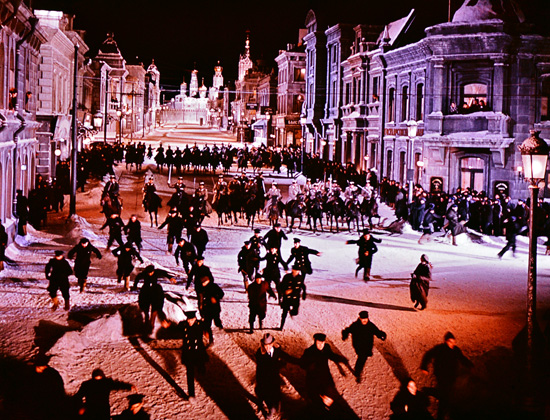 When the shouts of Russian Revolutionists, the marching of heavy booted feet
and the chanting of "The Warshavianka" shattered the normal nocturnal
stillness of the tiny Madrid suburb of Canillas during the production of
"Doctor Zhivago," it marked the climax to almost a year of planning and
actual construction of one of the largest and most impressive film sets ever
constructed by a motion picture company for location shooting.
The scenes themselves were an authentic re-creation of one of the typical
demonstrations staged by workers, students and Bolsheviks in Moscow during
the early 20th century, when a rising Revolutionary spirit was sweeping
Russia. But they could not have been realized without the amazingly
realistic background provided by the 10-acre complex of Moscow streets in
which they were filmed.
Before the final scenes were shot, the set had been periodically altered
from its original 1905 snow-covered facades through four seasonal changes
over a 30-year span of the story. When the shouts of Russian Revolutionists, the marching of heavy booted feet
and the chanting of "The Warshavianka" shattered the normal nocturnal
stillness of the tiny Madrid suburb of Canillas during the production of
"Doctor Zhivago," it marked the climax to almost a year of planning and
actual construction of one of the largest and most impressive film sets ever
constructed by a motion picture company for location shooting.
The scenes themselves were an authentic re-creation of one of the typical
demonstrations staged by workers, students and Bolsheviks in Moscow during
the early 20th century, when a rising Revolutionary spirit was sweeping
Russia. But they could not have been realized without the amazingly
realistic background provided by the 10-acre complex of Moscow streets in
which they were filmed.
Before the final scenes were shot, the set had been periodically altered
from its original 1905 snow-covered facades through four seasonal changes
over a 30-year span of the story.The complex consisted of a half-mile long paved business street, dominated by the famous Kremlin and complete with half a hundred shops; a tram line, over which ran trolley cars of the period; a street in the factory workers' section of the city with a viaduct and railway tracks above it; a square featuring a statue of Alexander II on horseback; a police station; a church and, most unusual of all, three complete interior settings and detailed entranceways to six other interior settings, built on sound stages at the studio. Among impressive details of the huge street setting were the well-filled shop windows, each representing a Russian business enterprise, with products on display changed to correspond with the advancing years of the story. Exterior signs and window lettering also had to undergo certain revisions to conform to the minor changes in the Russian alphabet made during the story's time span. Street car tracks stretched the length of the street, with electricity for the overhead trolley lines brought into the set from a power plant a quarter of a mile away. The cars themselves were built in England early in the 20th century and exported to Spain. From the main business street (of which only the visible sections were built to give the illusion of actual height and size), narrow passageways led to a contrasting street in the poor section of Moscow, paralleling its better-dressed neighbor and terminating in a factory with tall twin smokestacks. |
|
Facts And Figures On The Moscow Streets |
|
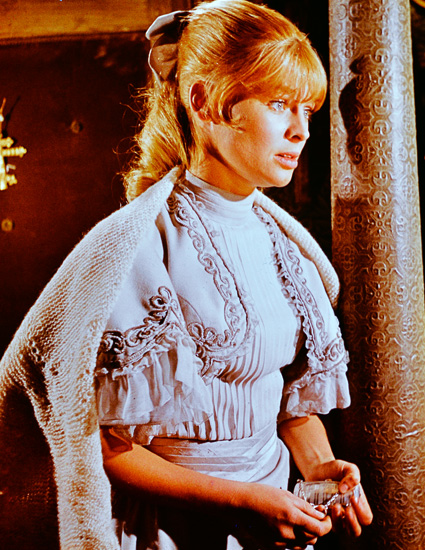 Location: Madrid suburb of Canillas two miles from C.E.A. Studios.
Area of set and facilities: 10 acres. As many as 780 men worked on the set
over the 6 months period of construction. Location: Madrid suburb of Canillas two miles from C.E.A. Studios.
Area of set and facilities: 10 acres. As many as 780 men worked on the set
over the 6 months period of construction.These consisted of: 210 carpenters 120 plaster specialists 60 masons 25 tubular steel specialists 30 painters, including sign artists 20 electricians 10 welders 305 workmen (unskilled) 710,000 linear feet, or approximately 135 miles of tubular steel was used in the framework. Some 90,000 fittings were required. The lumber used consisted of: 170,000 linear feet of pine 46,200 square feet of hard board 95,000 square feet of plywood 42,000 feet of laths 44,500 square feet of cane screening (for inside walls) 32,800 square feet of asbestos sheets were used for practical roofing. For streets and sidewalks a total of 65,000 square feet of concrete, 4 inches thick, was laid. Approximately 55,000 hollow bricks were used and these were held together and surfaced by 97,000 pounds of cement. The mammoth plastering job required 1,110,350 pounds of plaster, 22,300 square yards of scrim cloth and 92,000 pints of Vermiculite. A total of 14,810 pounds of plaster wadding, or hemp grass, was requited and one and one-half tons of soap paste was used for moulds. 6 tons of nails were used. 57,692 pounds of paint were mixed. A total of 820 brushes were used, of which 370 were completely worn out on the assignment. 11,600 square feet of glass was supplied for windows, including approximately 3,600 square feet of heavy plate for store windows. |
|
Filming in Finland |
|
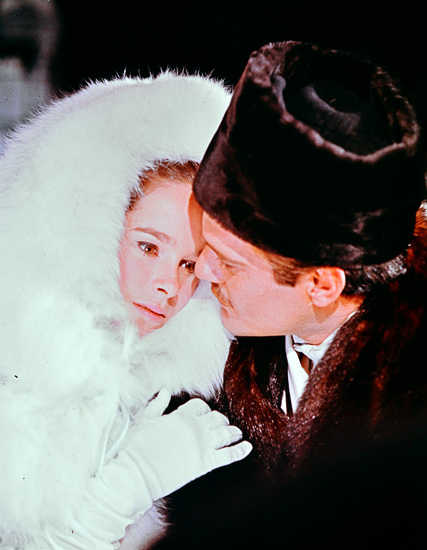 In order to obtain scenes of deep snows and wintry vistas in simulation of
the Siberia where part of the Russian novel is laid, Lean and his crew
embarked for Finland, the first time a major motion picture company has ever
invaded that Scandinavian country for location shooting.
Headquarters were established at Joensuu, a town of 20,000, located about
400 miles north of Helsinki — not far from the actual Arctic Circle, and
less than 75 miles from the actual Russian border on the through highway to
Leningrad. Temperatures in this snowy region ranged from an impressive 40 to
10 degrees below zero.
Many scenes were photographed on Lake Pyhaselka, which was covered by
waist-high snow on top of its four-foot-thick ice. It was on this huge
expanse of snow and ice that the Russians laid railroad tracks in 1940
during the first winter of their war with Finland. Trains were moved over
them until they were removed by the Russians just before the summer thaw. In order to obtain scenes of deep snows and wintry vistas in simulation of
the Siberia where part of the Russian novel is laid, Lean and his crew
embarked for Finland, the first time a major motion picture company has ever
invaded that Scandinavian country for location shooting.
Headquarters were established at Joensuu, a town of 20,000, located about
400 miles north of Helsinki — not far from the actual Arctic Circle, and
less than 75 miles from the actual Russian border on the through highway to
Leningrad. Temperatures in this snowy region ranged from an impressive 40 to
10 degrees below zero.
Many scenes were photographed on Lake Pyhaselka, which was covered by
waist-high snow on top of its four-foot-thick ice. It was on this huge
expanse of snow and ice that the Russians laid railroad tracks in 1940
during the first winter of their war with Finland. Trains were moved over
them until they were removed by the Russians just before the summer thaw.For several weeks Lean used bulldozers, trucks and tons of equipment made mobile on huge sledges in filming scenes showing Yuri Zhivago on his dramatic journey across the Russian steppes after escaping from Revolutionists. Each morning a representative of Finland's State Engineering Department tested the ice to ensure that it would be safe enough for such an operation. The only mishap occurred when one section of the ice gave way and a trailer slid beneath the surface. The Finnish driver leaped to safety and the horse was rescued before the vehicle disappeared into the icy water. The state-owned Finnish Railways provided the company with 32 freight cars and two wood-burning engines of historic value. These were revamped to simulate Russian trains of half a century ago and were moved more than 1200 miles over tracks extending as far as Savonlinna on the remote northern wasteland and within 10 miles of the Russian border. One of the biggest problems encountered by the film company was the task of finding, and hiring extras to appear in some of the mob scenes. There is no un-employment in Finland, but Lean was finally able to cull extras for the necessary character parts from the band of Lapland gypsies who wander across the northern sections of that country. Most of them had never even seen a motion picture before, but were willing to 'act' for the director and proved to be perfect types to portray the Siberian refugees during the war sequences in the film. In addition to filming scenes on Lake Pyhaselka and on the railroad lines, other sequences were staged in the forest near Koli and on more than a dozen other location sites in the Joensuu area. |
|
About Boris Pasternak |
|
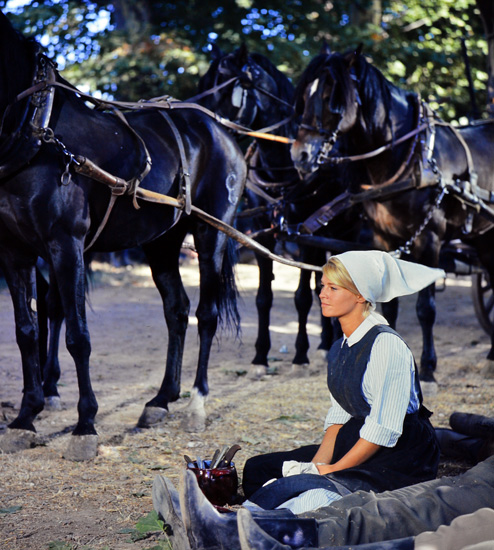 The announcement on October 23, 1958, that Boris Pasternak had been awarded
the Nobel Prize for Literature touched off a controversy that focused the
eyes of the literary and political worlds on the quiet, scholarly man, who
had become internationally famous as a poet and translator of German and
English classics, especially the plays of Shakespeare. The honor paid the
author became the "Pasternak Affair". The events surrounding it developed
into a great and moving drama. Inside the Soviet Union he became the center
of a vast political controversy. The communist press turned against him. The
Soviet Writer's Association expelled him. The humiliation and threats he
endured were beyond belief, although his selection for the Award was
universally applauded.
Pasternak's acceptance of the prize would have required his attendance at
ceremonies in Stockholm. He was advised that if he left Russia for this
purpose he would not be permitted to return. After much soul searching, he
declined the Prize, explaining in a famous letter to Premier Khruschev: "I
am bound to Russia by my birth, my life and my work. For me to leave my
country would be to die.'' And it was in his beloved land that he died in
his sleep on May 30, 1960, at his home in a writers' colony 20 miles from
Moscow. The announcement on October 23, 1958, that Boris Pasternak had been awarded
the Nobel Prize for Literature touched off a controversy that focused the
eyes of the literary and political worlds on the quiet, scholarly man, who
had become internationally famous as a poet and translator of German and
English classics, especially the plays of Shakespeare. The honor paid the
author became the "Pasternak Affair". The events surrounding it developed
into a great and moving drama. Inside the Soviet Union he became the center
of a vast political controversy. The communist press turned against him. The
Soviet Writer's Association expelled him. The humiliation and threats he
endured were beyond belief, although his selection for the Award was
universally applauded.
Pasternak's acceptance of the prize would have required his attendance at
ceremonies in Stockholm. He was advised that if he left Russia for this
purpose he would not be permitted to return. After much soul searching, he
declined the Prize, explaining in a famous letter to Premier Khruschev: "I
am bound to Russia by my birth, my life and my work. For me to leave my
country would be to die.'' And it was in his beloved land that he died in
his sleep on May 30, 1960, at his home in a writers' colony 20 miles from
Moscow.Although the Nobel Prize was awarded Pasternak for his literary genius, there is little doubt that it was "Doctor Zhivago", his first and only full-length novel, that earned him this honor. Pasternak was born in Moscow in 1890, the son of Leonid Pasternak, a noted teacher and painter, and Rosa Kaufman, a brilliant concert pianist. At the age of ten, he moved to Paris with his parents, who remained there for the rest of their lives. Young Boris, however, returned to Russia and in 1909 began to study law at Moscow University. He soon switched to philosophy. Following a summer at Marburg University in Germany, he spent time travelling through Italy. The art, music and literature in these two countries strongly influenced him. Because of a slight limp, he was not called upon for military participation in either World War I or the Russian Revolution, but there is little doubt that these shattering events shaped his thinking for his entire life. During the War he worked in a factory in the Urals and after the revolution was employed in the Library of the Commissariat for Education. He began writing poems during this period and the dozens that he published between 1917 and 1932 earned him a highly respected reputation through much of the world. In 1932 an autobiographical poem, "Spectorsky," resulted in accusations within Russia of antisociability. From 1933 on he lived a semi-retired life, devoting his time mainly to translations of foreign poets and playwrights. In 1954 "Doctor Zhivago" was announced for publication in Russia and the manuscript was sent to a publisher in Italy, one in France and one in England. Soviet authorities, however, decided the book was not favorable to the Communist cause. They ordered the manuscripts returned. Giangiacomo Feltrinelli, the Italian publisher, refused to comply. And so it was, that this great Russian classic first appeared. It has not yet been published inside Russia. Boris Pasternak was not a writer of political ideologies or a sponsor of causes. Rather he was a man who believed the value of human life cannot be measured in theories and dogmas. His courage in expressing this in "Doctor Zhivago" has been rewarded with a success few modern authors have achieved. |
|
About the Cast |
|
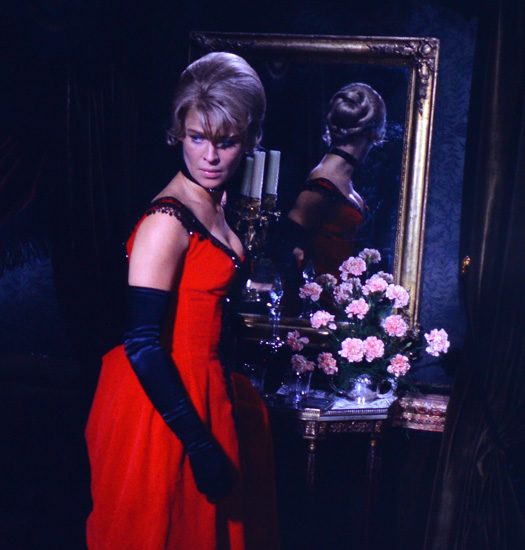 The actors and actresses selected for top roles in this picture make up what
one commentator has called "The most talented and unusual cast in many
years." Another, referring to the young players in it, headlined his
article: "Doctor Zhivago"—The Film That is Making Stars. The actors and actresses selected for top roles in this picture make up what
one commentator has called "The most talented and unusual cast in many
years." Another, referring to the young players in it, headlined his
article: "Doctor Zhivago"—The Film That is Making Stars.GERALDINE CHAPLIN...The 21 -year-old daughter of Charles Chaplin won the role of Tonya following a screen test by Director Lean, which she passed with flying colors. Born in Los Angeles, she moved to Switzerland with her parents at the age of eight, was educated in a private school near Vevey, studied ballet in London and danced briefly in a French ballet in Paris. Miss Chaplin made her motion picture debut opposite Jean-Paul Belmondo in the French film, "A Lovely Summer Morning." JULIE CHRISTIE...Born in Assam, India, where her father was a British tea planter, Miss Christie attended school in England, but at sixteen moved to Paris to study art. Later she became a dramatic student in London, gained experience in repertory, and appeared on television before making an auspicious screen debut in "Billy Liar." She toured Europe, Russia and the eastern United States with the Royal Shakespeare Company, and has appeared most recently on the screen in "Young Cassidy" and "Darling." She is seen as Lara in "Doctor Zhivago." TOM COURTENAY...won the top acting award at the Venice Film Festival for his performance in "King and Country" and has scored in "The Loneliness of the Long Distance Runner," "Operation Crossbow" and "King Rat." He plays the role of Pasha in "Doctor Zhivago." Born in Hull, England, Courtenay studied at the University of London and the Royal Academy of Dramatic Arts. Joining the Old Vic Company, he made his acting debut in Chekhov's "The Seagull." He replaced Albert Finney in the London stage presentation of "Billy Liar" and starred in the film version. ALEC GUINNESS...Cast as Yevgraf in "Doctor Zhivago," Alec Guinness makes his fifth appearance in a David Lean film, after making his screen debut in "Great Expectations." The other Lean films have been "Oliver Twist," "The Bridge on the River Kwai," for which he won an Academy Award, and "Lawrence of Arabia." Born in London, Guinness worked briefly in an advertising agency before making his debut on the London stage in "Queer Cargo." He has since divided his time between stage and screen and has appeared in some 30 films. Last year, his performance on Broadway in "Dylan" won him the Tony Award as Best Actor. |
|
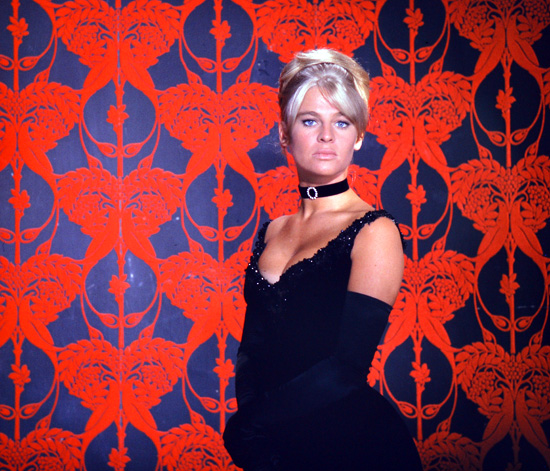 SIOBHAN McKENNA...has an imposing list of credits in the theatre, films and
television here and abroad. Born in Belfast, Ireland, she studied at Galway
University. After her debut at Dublin's famed Abbey Theatre, she went on to
enormous success in London and New York, one of her great hits being in
Shaw's "Saint Joan." She is the only Irish actress to be honored with a full
season at the Shakespeare Memorial Theatre at Stratford-on-Avon. Miss
McKenna made her film debut in 1947 in "Hungry Hill." In "Doctor Zhivago"
she plays Anna Gromeko. SIOBHAN McKENNA...has an imposing list of credits in the theatre, films and
television here and abroad. Born in Belfast, Ireland, she studied at Galway
University. After her debut at Dublin's famed Abbey Theatre, she went on to
enormous success in London and New York, one of her great hits being in
Shaw's "Saint Joan." She is the only Irish actress to be honored with a full
season at the Shakespeare Memorial Theatre at Stratford-on-Avon. Miss
McKenna made her film debut in 1947 in "Hungry Hill." In "Doctor Zhivago"
she plays Anna Gromeko.RALPH RICHARDSON...scored one of his greatest screen successes in David Lean's "The Sound Barrier" and one of his biggest stage hits in Robert Bolt's "Flowering Cherry." Born in Cheltenham, England, he made his acting debut at the age of nineteen in "The Merchant of Venice." Since then he has played leading roles in literally scores of plays in England and the United States. He is seen as Alexander Gromeko in "Doctor Zhivago." OMAR SHARIF . . Since his performance in "Lawrence of Arabia," for which he won an Academy Award nomination, Sharif has starred in "The Fall of the Roman Empire," "Behold a Pale Horse," "The Yellow Rolls-Royce" and "Ghengis Khan." He was Lean's first and only choice for the title role in "Doctor Zhivago." Born in Alexandria, Egypt, and educated at Victoria College, Cairo's English University, Sharif became one of Egypt's top motion picture stars, appearing in more than 20 films prior to his selection for a major role in "Lawrence of Arabia," which made him internationally famous. ROD STEIGER...won an Academy Award nomination for his performance in "On the Waterfront," the 1953 Sylvania Award as Best Actor of the Year, and the Berlin Film Festival Award for "The Pawnbroker." His Italian-produced film, "Hands in the City," won the Venice Film Festival's Grand Prize in 1963 and his TV play, "The Lonely Wizard," won an Emmy Award in 1958. The only American in the cast of "Doctor Zhivago," he is seen as Komarovsky. Born in Westhampton, Long Island, he studied at the Actor's Studio. He made his Broadway debut in 1948 in "Night Music" and his film debut in 1951 in "Theresa." RITA TUSHINGHAM...whose waif like charm brought her international fame in her first film, "A Taste of Honey," was a student with the Liverpool Players when she was given the lead in that film by director Tony Richardson. Born in Liverpool, she has starred in several plays on the London stage and in six motion pictures, most recently in "The Girl with the Green Eyes" and "The Knack." In "Doctor Zhivago," she plays The Girl, the character who opens and closes the story. |
|
About the Director |
|
 Sir
David Lean and Sir Sydney Samuelson. Image from Sir Sydney's collection Sir
David Lean and Sir Sydney Samuelson. Image from Sir Sydney's collectionWhen asked why he chose "Doctor Zhivago," from the dozens of stories submitted to him each year, for a film-making project that would absorb his energies for at least three years, David Lean said: "When I read the book, it was the characters that first captured my imagination. They are fascinating people, all of them, and their personal stories are highly dramatic ones. The Russian Revolution itself was a towering historical event, one which has not yet been truly depicted in a motion picture. However, this is not the story of the Revolution, but rather the story of what happens to a small group of people when the Revolution crashes down on them. The drama, the horror and the turbulence of the Revolution simply provides the canvas against which is told a moving and highly personal love story." "Doctor Zhivago" is only David Lean's third film within a period of ten years — a fact which emphasizes the meticulous care he devotes to his productions. The result of such dedicated film-making speaks for itself in "The Bridge on the River Kwai" and "Lawrence of Arabia," Lean's two previous films. Between them they have won 14 Oscars. Lean was named Best Director for each, and each picture was honored as Best Picture of the Year. Born in Croydon, England, and educated in a Quaker school, Lean began his film career in 1928 as a camera assistant at the Gainsborough Studios in England. Part of the time he worked as third assistant director, with duties varying from running messages to carrying afternoon tea. He soon decided, however, that he'd like to be a film editor. By studying the mechanics of cutting and splicing, he developed an eye for the most effective shots and a gift for combining them into effective continuity. Progressing rapidly, he soon had such films as "Pygmalion," "Escape Me Never" and "The Invaders" to his credit and became known as the finest editor in the business. Noel Coward gave him his first chance as a director with "In Which We Serve," one of Britain's outstanding war films. During the next several years, Lean directed such notable productions as "This Happy Breed," "Blithe Spirit," "Brief Encounter," "Great Expectations," "Oliver Twist," "The Sound Barrier," "Hobson's Choice" and "Summertime." Made in Italy, the latter was his first directorial effort outside of England. It was "The Bridge on the River Kwai," however, that marked the beginning of Lean's identification with location films. |
|
About the Writer |
|
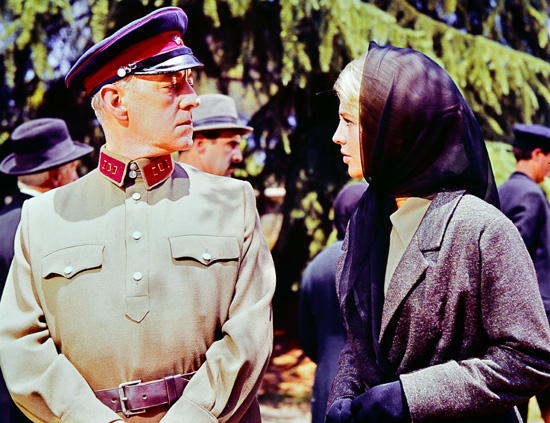 Robert Bolt is one of Britain's most literate, successful and highly
regarded playwrights. His plays, "Flowering Cherry", "The Tiger and the
Horse," and "A Man For All Seasons," have earned him high praise on both
sides of the Atlantic, a background which soon led to the impressive task of
writing the screenplay for "Lawrence of Arabia" and establishing a firm
liaison with director David Lean. Early in 1963, work brought them together
again for the herculean task of writing the screenplay for "Doctor Zhivago"
from the Boris Pasternak novel.
Born in Manchester, England, he attended the local grammar school, then went
to work for a year in an insurance office. Following three years in the
Army, he returned to Manchester to take an Honors in history and became a
schoolteacher.
Bolt's first writing was for radio, but his ambition was to turn out an
acceptable stage play. In 1957, success finally came and has grown steadily
ever since. His enthusiasm and interest in the screen has been so stimulated
that he now plans to divide his efforts between the two mediums. Robert Bolt is one of Britain's most literate, successful and highly
regarded playwrights. His plays, "Flowering Cherry", "The Tiger and the
Horse," and "A Man For All Seasons," have earned him high praise on both
sides of the Atlantic, a background which soon led to the impressive task of
writing the screenplay for "Lawrence of Arabia" and establishing a firm
liaison with director David Lean. Early in 1963, work brought them together
again for the herculean task of writing the screenplay for "Doctor Zhivago"
from the Boris Pasternak novel.
Born in Manchester, England, he attended the local grammar school, then went
to work for a year in an insurance office. Following three years in the
Army, he returned to Manchester to take an Honors in history and became a
schoolteacher.
Bolt's first writing was for radio, but his ambition was to turn out an
acceptable stage play. In 1957, success finally came and has grown steadily
ever since. His enthusiasm and interest in the screen has been so stimulated
that he now plans to divide his efforts between the two mediums. |
|
About the Producer |
|
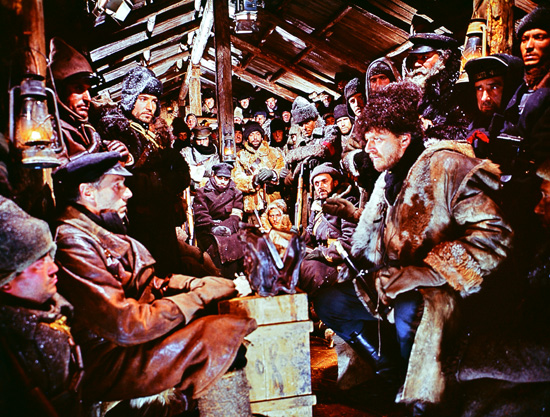 The name of Carlo Ponti has become synonymous with fine motion picture
entertainment. After producing many of the most successful Italian films of
the past two decades, he has produced, in association with M-G-M, three of
the most ambitious motion pictures in the world. They are: "Operation
Crossbow," "Lady L" and, of course, "Doctor Zhivago." Born in Milan, Ponti
first studied law at the University of Milan. He became interested in films
while still a student, and, after graduation and several years of law
practice, began to acquire properties that might be suitable for films and
then surrounded himself with the finest writing, acting and technical talent
available in Italy. His first film, "Little Old Worlds," made in Milan, was
an immediate success.
Ponti is equally at home in Rome, New York, Paris, London or Madrid. It is
not unusual for him to breakfast in Paris, lunch in New York and breakfast
in Paris the following morning, after having completed arrangements for a
new picture.
Other recent successful pictures, have been "Marriage, Italian Style,'' "Two
Women" and “Yesterday, Today and Tomorrow”. The name of Carlo Ponti has become synonymous with fine motion picture
entertainment. After producing many of the most successful Italian films of
the past two decades, he has produced, in association with M-G-M, three of
the most ambitious motion pictures in the world. They are: "Operation
Crossbow," "Lady L" and, of course, "Doctor Zhivago." Born in Milan, Ponti
first studied law at the University of Milan. He became interested in films
while still a student, and, after graduation and several years of law
practice, began to acquire properties that might be suitable for films and
then surrounded himself with the finest writing, acting and technical talent
available in Italy. His first film, "Little Old Worlds," made in Milan, was
an immediate success.
Ponti is equally at home in Rome, New York, Paris, London or Madrid. It is
not unusual for him to breakfast in Paris, lunch in New York and breakfast
in Paris the following morning, after having completed arrangements for a
new picture.
Other recent successful pictures, have been "Marriage, Italian Style,'' "Two
Women" and “Yesterday, Today and Tomorrow”. |
|
A few of the million words that have been written about "Doctor Zhivago" |
|
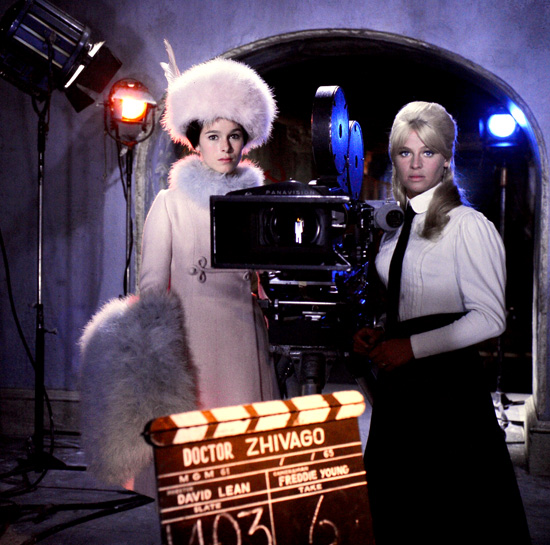 "Lean is, above all, a craftsman, an encyclopedia of technique, and a subtle
manipulator of audience emotions." — NEW YORK TIMES "Lean is, above all, a craftsman, an encyclopedia of technique, and a subtle
manipulator of audience emotions." — NEW YORK TIMES"Geraldine Chaplin is standing on the threshold of certain screen stardom." — ST. PAUL PIONEER PRESS "Pasha, the taciturn, sarcastic young revolutionary who almost steals the book from Zhivago, is a part to fire Tom Courtenay who has said of his acting, 'I am heart and stomach and soul'." — VOGUE "Julie Christie is sensational in Pasternak's 'Doctor Zhivago'." — CINCINNATI ENQUIRER "Boris Pasternak's novel is a love story set against one of the biggest social upheavals in history and Mr. Lean is keeping it that way in the film. Spectacle in this picture is only a frame for intimacy." — LONDON EVENING STANDARD "The magic name of Chaplin has returned to motion pictures. Geraldine Chaplin's role as Tonya will zoom her to stardom." — ST. LOUIS DISPATCH "Miss Christie stepped from a year in repertory into the headlines, hurtling skywards, and now her name dominates the cinema screens." — NORWICH, ENGLAND EASTERN EVENING NEWS "Geraldine Chaplin stands shyly on the brink of stardom." — YOUNGSTOWN, OHIO VINDICATOR "The casting of Geraldine Chaplin was no publicity-seeking device. 'Zhivago' makers are two of the best: Britain's David Lean and Italy's Carlo Ponti." — DETROIT NEWS |
|
 "Julie Christie, gay, piquant, attractive, is one of the most famous young
stars of the moment." — CINE EN SIETE DIAS — MADRID "Julie Christie, gay, piquant, attractive, is one of the most famous young
stars of the moment." — CINE EN SIETE DIAS — MADRID"When she made her first film, 'On a Lovely Summer Morning,' another Chaplin career dawned. Now Geraldine is living up to those great expectations in her starring role as Tonya." — NEW YORK SUNDAY NEWS "Now that movie contracts are piling up, Geraldine Chaplin has entered the hard life of an artist to get on her own what her father could have given her without any effort." — LUCHA-TERUEL, SPAIN "Geraldine Chaplin and Julie Christie are supported by an extraordinary group of stars. It's a collection to make the cinema connoisseur's mouth water with anticipation." — BOSTON GLOBE "With her heritage Geraldine Chaplin should be standing confidently on the threshold of certain screen stardom." — TORONTO TELEGRAM "Her father's talent shines through in Geraldine's acting." — WICHITA SUNDAY EAGLE and BEACON "Geraldine Chaplin has talent worthy of her name." — CHICAGO SUNDAY TIMES "At twenty years old Geraldine Chaplin has arrived where others never will after a life-time of struggle." — PATERSON, NEW JERSEY RECORD "Julie Christie, a freewheeling, grey-eyed British blonde, is probably the best young actress in films today." — PARADE "It seems that every top film maker is looking for a vehicle which might entice Geraldine Chaplin into his fold as soon as she completes her role in 'Doctor Zhivago'." — HOLLYWOOD CITIZEN-NEWS "... Julie Christie is the rare material of which the memorable stars are made." — WEEKEND MAGAZINE " 'Doctor Zhivago' is probably the most important picture of the year." — GLASGOW EVENING CITIZEN "Julie Christie has a rare combination of inner beauty plus a highly disciplined talent." — LOS ANGELES TIMES |
|
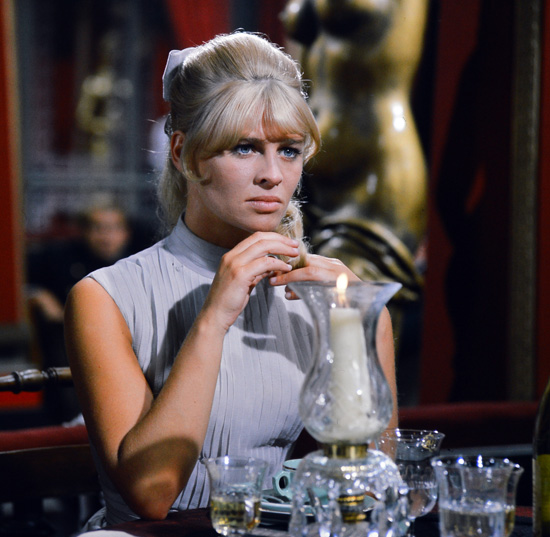 "Stardom seems about to come positively and swiftly to Geraldine Chaplin
with her major role-Tonya-in this very major production." — GLAMOUR "Stardom seems about to come positively and swiftly to Geraldine Chaplin
with her major role-Tonya-in this very major production." — GLAMOUR"Geraldine Chaplin performed so well, with such depth, grace, and instantaneous understanding of the lines that Lean declared she was a natural and gave her the part. Of Geraldine he exclaims, 'I have never seen stardom come off the screen so positively as in her test'." — WASHINGTON POST "All Hollywood says that 'Doctor Zhivago' will be in the same tradition of 'Bridge On The River Kwai' and 'Lawrence of Arabia': sweeping, magnificent, fully equal to the complexity and subtlety of the plot." — CHRISTIAN SCIENCE MONITOR "David Lean is striving to capture the confusion of a profound intelligence confronted by events of immeasurable impact, as though through the eyes of men past who have unknowingly witnessed the most decisive moments of mankind." — CINE-MONDE ". . . one of the year's most exciting projects ... a rich assortment of talents." — MEMPHIS PRESS SCIMITAR "Geraldine Chaplin is starting at the top ..." — LOOK MAGAZINE "The most prominent actor in the cast is the British Alec Guinness. When Lean offered him his role, he accepted right away, without knowing who he was supposed to play. There was a reason for his quick decision: in Lean's, "Bridge on the River Kwai," he played the role that brought him the first 'Oscar' of his career." —DER SPEIGEL—GERMANY "... a vast panorama that probes the fundamental values of man's existence." — SPOKANE SPOKESMAN REVIEW |
|
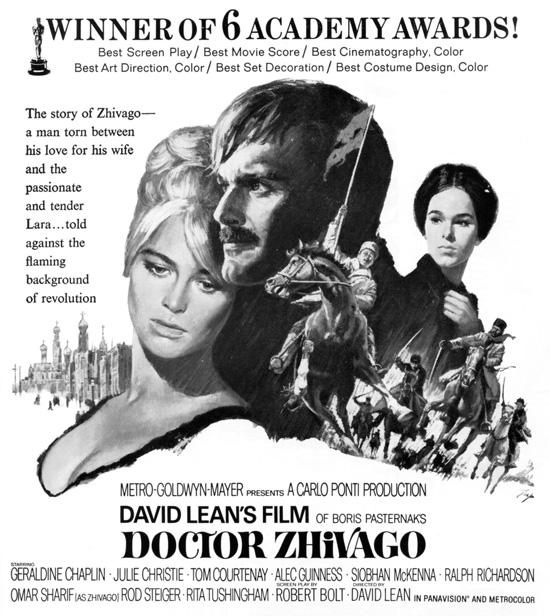 "It will be M-G-M's most important picture in years."
— DALLAS TIMES-HERALD "It will be M-G-M's most important picture in years."
— DALLAS TIMES-HERALD"It is powerful stuff. Could have all the appeal of a later-day 'Gone With the Wind'." —THE OBSERVER "Director David Lean, after working with Miss Chaplin a week, said: 'She has that indefinable spark that spells movie stardom. Personality seems to leap from the screen'." — Hedda Hopper 'Doctor Zhivago' will be one of the greatest films in the history of motion pictures." — Dorothy Kilgallen "London critics predict that Julie Christie is destined to be England's top cinema export." — NEW ORLEANS TIMES-PICAYUNE "Having just completed her starring role in 'Doctor Zhivago,' it's readily apparent that Geraldine Chaplin has inherited her father's talent." — THE CHARLOTTE, NORTH CAROLINA OBSERVER "Everything done by David Lean has been of high quality. He is one of the few about whom it can be said that he has never made a bad film." — EKSTRA BLADET— DENMARK "Geraldine Chaplin emerges from the shadows of genius in enacting her role as Tonya. She's fantastic, say those in the 'know'." — PAGEANT "Already this drama of the Russian Revolution is being likened to 'Gone With the Wind' as a Spectacle." — Louella Parsons "Bolt's screenplay is highly literate and, in...the tradition of the Russian novel, its characters and plots unravel themselves at a solid majestic pace. It is powerful stuff." — SHOW "His actors are stars upon whom he exercises that magic Lean touch which makes them better than they are, and turns extras into inspired performers." — SHREVEPORT, LA. JOURNAL "Geraldine Chaplin is obviously this year's new big Star." — Sheila Graham "David Lean's film of Boris Pasternak's much-discussed novel, 'Doctor Zhivago,' is making a tremendous impact on the Spanish capital. The film has received nothing but support from the Spanish government." — SAN FRANCISCO CHRONICLE " 'There is no question in my mind,' Sharif said. 'Geraldine was born for stardom'." — RICHMOND TIMES DISPATCH |
|
The Cast / Credits |
|
|
Geraldine Chaplin (Tonya), Julie Christie
(Lara), Tom Courtenay (Pasha), Alec Guinness (Yevgraf), Siobhan Mckenna
(Anna), Ralph Richardson (Alexander), Omar Sharif (Yuri Zhivago), Rod
Steiger (Komarovsky), Rita Tushingham (the girl) David Lean’s film "Doctor Zhivago" Screenplay by ROBERT BOLT. From the Novel by BORIS PASTERNAK. Music by MAURICE JARRE. Director of Photography FREDDIE YOUNG. Production Designer JOHN BOX. Costumes by PHYLLIS DALTON. Directed by DAVID LEAN. Produced by CARLO PONTI. Presented by METRO - GOLDWYN - MAYER. In PANAVISION® and METROCOLOR Printed in U.S.A. |
|
| Go: back - top - back issues - news index Updated 05-01-25 |
